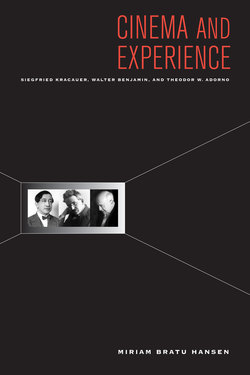Cinema and Experience

Реклама. ООО «ЛитРес», ИНН: 7719571260.
Оглавление
Miriam HANSEN. Cinema and Experience
Отрывок из книги
Cinema and Experience
Edward Dimendberg, Martin Jay, and Anton Kaes, General Editors
.....
Kracauer’s relation to Jewish messianism is a complex issue. Raised in a practicing Jewish environment and briefly active in the Freies Jüdisches Lehrhaus (a Frankfurt circle of learning and debate surrounding Rabbi Nehemiah Nobel and crucially shaped by its first director, Franz Rosenzweig),64 Kracauer began to voice vehement criticism of the ongoing revival of messianic thought, especially in its combination with a socialist (in Kracauer’s reading, protestant) mystique of community. In his programmatic essay of 1922, “Those Who Wait” (“Die Wartenden”), for instance, he castigates the “messianic Sturm und Drang types of the communist persuasion,” a label most likely referring to Bloch, whose book on Thomas Münzer he had savaged in a review earlier that year.65 Like other contemporary movements of religious renewal, the Jewish messianists, in Kracauer’s view, superimposed a transcendental reality upon an immanent historical process and thus, by abstracting from the real world “filled with corporeal things and people,” ended up just as ignorant of the divine that they presumed to know so well (MO 140; S 5.1:169). Kracauer’s politics of “waiting,” of a “hesitant openness” (MO 138), was directed against the absolutism with which messianic thinkers leaped over the imperfect yet existing reality from the perspective of a future break; by contrast, he turned his gaze toward the changing realm of the here and now, the mundane zone of the ordinary and ephemeral. “Access to truth is now in the profane,” he proclaimed at the end of his 1926 polemical review of Martin Buber and Rosenzweig’s translation of the Bible (MO 201; S 5.1:365).66
Nonetheless, Kracauer participated in the discourse of secular Jewish messianism in significant ways. Much as he abhorred notions of an imminent and immanent instantiation of the Messiah, an “aura of eschatological longing” emanates, as Michael Schröter observes, from the “luminous metaphors” of his texts.67 And even when he updates his metaphysical language with concepts indebted to the Enlightenment (the French materialist lineage rather than the German idealist one) and to early Marx, a distinctly apocalyptic undercurrent continues to characterize his observations of contemporary life—a perception of modernity as a traumatic upheaval heading toward catastrophe. Like Benjamin at this point, Kracauer rejects all promises of immanent and gradual change and defers any envisioning of a different order to history’s inevitable cataclysmic break. Accordingly, the only attitude available to the Jewish intellectual is a hesitant form of waiting, as opposed to more fervent anticipation or even active intervention. As he writes to Löwenthal in 1924: “We must remain hidden, quietistic, inactive, a thorn in the side of others, preferring to drive them (with us) to despair rather than give them hope.”68 This “revolutionary negativity,” which Kracauer still endorsed as late as 1929, is theologically grounded in the axiom to refrain from direct assertions and to preserve empty spaces (Hohlräume) for the “unsaid”—and as yet unsayable—positive.69
.....